|
|
|
Sort Order |
|
|
|
Items / Page
|
|
|
|
|
|
|
| Srl | Item |
| 1 |
ID:
188108
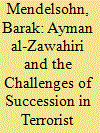

|
|
|
|
|
| Summary/Abstract |
What challenges do newly appointed terrorist leaders face? The paper proposes four primary needs all new leaders consider, including acceptance by the organization’s members, assuming control, maintaining organizational coherence and unity, and overcoming counterterrorism pressures. The magnitude of each challenge may differ depending on the predecessor’s character, the organization’s institutionalization level, the group’s ideological and strategic coherence, the availability of material resources, and communal support. This analytical framework is then used to assist the paper’s second objective: understanding how Ayman al-Zawahiri, who succeeded bin Laden, negotiated these challenges and the tradeoffs he made. Shifts in Al Qaeda’s operational environment required al-Zawahiri to confront challenges more complex than his predecessor had faced, even as he had fewer tools to solve them. Facing authority crisis, magnified by the incoherence between Al Qaeda’s central leadership and its branches and Al Qaeda’s inability to control its branches, al-Zawahiri increased decentralization, embraced affiliates’ local focus, promoted efforts to raise Al Qaeda’s local appeal, and sought to reduce U.S. interest in targeting the group. He kept Al Qaeda alive, but saw its stature shrink significantly.
|
|
|
|
|
|
|
|
|
|
|
|
|
|
|
|
| 2 |
ID:
164958
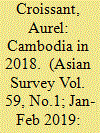

|
|
|
|
|
| Summary/Abstract |
In 2018, ever-incumbent Prime Minister Hun Sen scored a landslide victory in the Cambodian general elections. Three factors in particular explain this outcome. First, the elimination of the main opposition party, whose strategy of a peaceful election boycott failed. Second, favorable economic conditions and government handouts of spoils to constituencies that traditionally supported the opposition. Third, the weak leverage of the United States and the EU, and the Hun Sen regime’s strong links with China.
|
|
|
|
|
|
|
|
|
|
|
|
|
|
|
|
| 3 |
ID:
162084
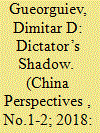

|
|
|
|
|
| Summary/Abstract |
President Xi Jinping is arguably the most powerful Chinese leader since Chairman Mao. Recent constitutional revisions and a midterm leadership reshuffle has only substantiated the fear that Xi, like Mao, has no intention of handing over power to a future successor. Does Xi’s rise signal an end to collective leadership and does a stronger president translate into a weaker party? In this article, I review the methods by which Xi has come to consolidate power as well as the implications for Chinese elite politics in the future. Drawing insights from the comparative literature, I question the zero-sum relationship between executive and institutional strength. Although Xi has certainly amassed unprecedented personal power, it has not necessarily come at the expense of the Party. Instead, the dangers of Xi Jinping’s power grab are more likely to result from a chilling effect on dissenting opinions and thinning out of the leadership pipeline, each of which is likely to undermine governing capacity over the medium to long-term.
|
|
|
|
|
|
|
|
|
|
|
|
|
|
|
|
| 4 |
ID:
185959
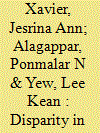

|
|
|
|
|
| Summary/Abstract |
This article examines the effect of academic qualifications and networking ties towards the evolvement of micro, small-medium, and large ethnic Indian enterprises in Malaysia. The study is based in multicultural Malaysia, where certain policies were implemented in favor of one specific ethnicity. Research indicates that better academic qualifications through transgenerational succession affect how entrepreneurs form connections with their families, co-ethnic networks, and inter-ethnic networks to develop their businesses. This article explains that while micro and smaller firms are choosing to remain in their ethnic identity, medium and larger corporations are willing to shed their ethnic identity for the rapid growth of their businesses. A framework is built from the understanding of literature and past evidence on ethnic Indian entrepreneurship in Malaysia. This article demonstrates the disparities of Malaysian Indian businesses that have progressed differently over the generations, due to the impact of human and social capital.
|
|
|
|
|
|
|
|
|
|
|
|
|
|
|
|
| 5 |
ID:
117662
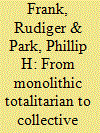

|
|
|
| 6 |
ID:
096257
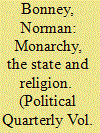

|
|
|
|
|
| Publication |
2010.
|
| Summary/Abstract |
Aspects of contemporary monarchy and government in relation to religion are out of step with contemporary society and require systematic reform. The removal of religious and gender discrimination in the arrangements for succession to the monarchy would be in conformity with modern anti-discrimination attitudes. The monarchy should also consider stepping back from its religious role. The monarch has an official role as Supreme Governor of the Church of England but less than a quarter of the population identify as Anglican and in its current attempts to be inclusive the monarchy seeks to respect and support other religions whose beliefs and practices are at variance with those of the C of E and the general population. In Scotland a new settlement could be promoted by the disestablishment of the Church of Scotland (comparable to the situation in Wales and Northern Ireland) and the ending of separate Roman Catholic state education.
|
|
|
|
|
|
|
|
|
|
|
|
|
|
|
|
| 7 |
ID:
113878


|
|
|
|
|
| Publication |
2012.
|
| Summary/Abstract |
Focusing on the early stage, this paper compares the Kim Il Sung-Kim Jong Il succession with the Kim Jong Il-Kim Jong Un succession. Analyzing their differences and similarities, the study attempts to provide a better understanding of the leadership formation of Kim Jong Un, who now rules North Korea.
|
|
|
|
|
|
|
|
|
|
|
|
|
|
|
|
| 8 |
ID:
120383
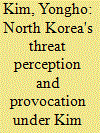

|
|
|
| 9 |
ID:
133771
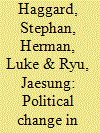

|
|
|
|
|
| Publication |
2014.
|
| Summary/Abstract |
During the succession from Kim Jong Il to Kim Jong Un, North Korea witnessed a revival of party institutions. However, the most distinctive feature of the transition was a succession of purges that replaced powerful figures from the Kim Jong Il era with new loyalists. The system remains personalist, but with strong reliance on the military and security apparatus.
|
|
|
|
|
|
|
|
|
|
|
|
|
|
|
|
| 10 |
ID:
081868
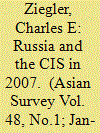

|
|
|
|
|
| Publication |
2008.
|
| Summary/Abstract |
Russia in 2007 moved further away from a constitutional order governed by the rule of law as President Vladimir Putin's second term drew to a close and the country prepared for parliamentary and presidential elections. High oil and gas prices buoyed the economy, but little progress was made in addressing Russia's serious social problems. In foreign policy, confrontation with the West was balanced by excellent relations with most of Asia
|
|
|
|
|
|
|
|
|
|
|
|
|
|
|
|
| 11 |
ID:
188938
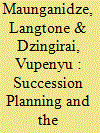

|
|
|
|
|
| Summary/Abstract |
The influence of succession on organisational sustainability has been widely acknowledged globally, but studies focusing specifically on farms remain relatively limited. This article examines the factors influencing succession in the newly occupied farms under the fast track land reform programme in Zimbabwe and their implications for the sustainability of the land reform programme. The study followed a qualitative multi-case research design. Data were collected using a combination of unstructured interviews, informal discussions, lived experience narrations and direct observations. Notwithstanding other structural and institutional constraints, the absence of succession arrangements and the politics of survival have been found to be the major threats to sustainability.
|
|
|
|
|
|
|
|
|
|
|
|
|
|
|
|
| 12 |
ID:
187258
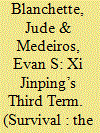

|
|
|
|
|
| Summary/Abstract |
During his first ten years in power, Chinese leader Xi Jinping has overseen substantial shifts in China’s political system and domestic economy, while also adopting a more activist and forceful foreign policy. With his likely third term beginning after the 20th Party Congress in October 2022, key questions remain about how his agenda will evolve. This article offers an assessment of Xi’s third term based on the key drivers and characteristics of Xi’s approach to domestic governance and foreign policy over the last two decades. It also explores how growing tensions and trade-offs will force policy shifts or otherwise constrain China’s growth. China seems likely to become more insular and self-referential, more frustrated and indignant and, ultimately, more alienated from the international community.
|
|
|
|
|
|
|
|
|
|
|
|
|
|
|
|
|
|
|
|
|